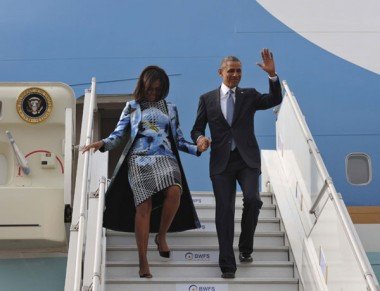Headlines
In India visit, US media sees geopolitical implications

Washington, Jan 28
Taking a generally positive
view of US President Barack Obama's India visit, the US media has
suggested that his personal chemistry with Prime Minister Narendra Modi
had opened a new chapter in India-US relations.
"After years of
near misses and unfulfilled promises," Obama and Modi "appear to have
set relations between their democracies on a deeper, perhaps even
revolutionary, path," the influential New York Times commented.
"Part
of the improvement in bilateral relations has to do with the personal
chemistry between the two, which by all accounts appears warm and
genuine," it said in an editorial titled "A New Chapter for America and
India."
Apart from "plenty of colourful symbolism" the Times said "There are strategic imperatives at work as well."
"Both
leaders need to expand their economies, and both see the other as a
crucial partner in offsetting China's increasingly assertive role in
Asia," it said suggesting "The potential for cooperation is
considerable."
With their talk of an "enduring commitment," Obama
and Modi "have raised expectations and set a firm basis for moving
forward," the Times said.
But "Building a true partnership will take sustained efforts over many decades."
The
Wall Street Journal in a review titled "A US-India Nuclear Test"
suggested "Obama's visit leaves Modi with a chance to show his reform
chops."
"Given the once-frosty relations between the US and
India, it is worth celebrating the bonhomie displayed by Messrs. Modi
and Obama this week, along with the growing cooperation between US and
Indian defence planners," it said.
"Yet protectionist policies
and political dysfunction in New Delhi continue to limit India's growth
as an economic and diplomatic power," the Journal said.
"The
latest US-Indian civil-nuclear pact is a test of Mr. Modi's ability to
overcome political resistance to pro-market reforms," it said.
CNN also wondered "Is Obama-Modi 'bromance' a turning point in US, Indian relations?"
"The
biggest takeaway from Obama's three days in India was the symbolism of
the leaders of the world's two biggest democracies cozying up," it said.
"But others would have seen greater geopolitical implications."
"Unlike
Obama's previous India visit in 2010, Pakistan was not a focus -- at
least in public statements," the news channel noted.
"Instead, India seems to be positioning itself for a more global role, playing a part in issues that go beyond its borders."
Giving
"symbolism its moment and its due," CNN suggested "Maybe it will make
India a more prominent player in global issues, over time."
"And
maybe, just maybe, India and the US may move a little closer to forming
the 'defining partnership' that Obama first promised in 2010," it said.
Obama's
visit to India had angered Pakistan, the Los Angeles Times suggested
citing Islamabad's comments lambasting the US "selectivity and
discrimination" favouring rival India.
"The comments reflected
deep concern in Pakistan that Obama's heavily choreographed embrace of
India and its ambitious new prime minister could jeopardise Islamabad's
lucrative but troubled relationship with Washington," it said.
(Arun Kumar can be contacted at [email protected])

























